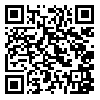BibTeX | RIS | EndNote | Medlars | ProCite | Reference Manager | RefWorks
Send citation to:
URL: http://hnmj.gums.ac.ir/article-1-305-en.html
Predictors of Diet Self-efficacy in Coronary Artery Disease Patients
By: Touba Hossein zadeh1, Ezzat Paryad 2 ,Ehsan KazemneJad3,Shahla Asiri4
Abstract:
Introduction: Coronary artery disease is one of the most prevalent cardiovascular diseases in developed countries. Following a healthy diet and lifestyle decline emergence of the disease complication and readmission rate due to unstable angina and myocardial infarction. Promotion of self-efficacy after a cardiovascular event is the outcome that plays a vital role in increasing rehabilitation skills to modify healthy behaviors.
Objective: This study aims to determine the predictors of diet self-efficacy in coronary artery disease patients.
Methods and Materials: In this cross-sectional study, 195 coronary artery disease patients who referred to Dr.Heshmat clinic of educational -medical center in Rasht, through simple sampling via completing a questionnaire. Chi-square ,multiple logistic regression tests were used to, analyze the relation between dependent and independent variables and predictors of diet self-efficacy were determined in coronary artery disease patients.
Results: Findings of this study revealed that most samples (86.2%) had desirable diet self-efficacy. There was a significant correlation between illness perception and diet self-efficacy (p<0.05). Regarding diet self-efficacy predictors, multiple logistic regression test indicated that if the other variables were fixed, per 1 unit illness perception , diet self-efficacy increase 1.05 times(p<0.0001).
Conclusion: According to results, illness perception was the important predictor in tendency of patients to follow cardiac diet program and patients with desired illness perception had higher confidence to control emerging changes in diet after cardiac event .Designing clinical educational programs and nursing interventions on the detection of predictors of diet self-efficacy could be effective in promotion of cardiac patients, self-efficacy in following health programs.
Keywords: Self-efficacy, Diet Self-efficacy, Coronary Artery Disease
1. MSc in nursing education (Medical-Surgical), Instructor of Guilan University of Medical Sciences
2. MSc in nursing (medical-surgical), Faculty member of Guilan University of Medical Sciences
3. PhD in Biostatistics, Assistant professor, Faculty member of Guilan University of Medical Sciences
4. MSc in nursing (Community health), Faculty member of Guilan University of Medical Sciences
Received: 2014/08/24 | Accepted: 2014/08/24 | Published: 2014/08/24
| Rights and permissions | |
 | This work is licensed under a Creative Commons Attribution-NonCommercial 4.0 International License. |



